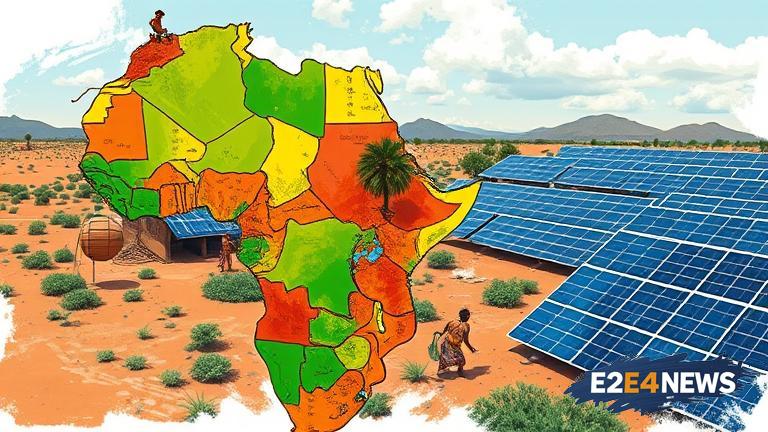The African continent is witnessing a significant shift towards renewable energy, driven by the need to address the pressing issues of energy access, climate change, and sustainable development. With many countries still struggling to provide reliable and affordable electricity to their citizens, renewable energy has emerged as a viable solution. Solar and wind power are becoming increasingly popular, with many African nations investing heavily in these technologies. In South Africa, for example, the government has set ambitious targets to increase the share of renewable energy in the national energy mix. Similarly, in Morocco, the kingdom has launched several large-scale solar and wind power projects to reduce its dependence on fossil fuels. The use of renewable energy is not only helping to reduce greenhouse gas emissions but also creating new job opportunities and stimulating local economies. In Kenya, the Lake Turkana Wind Power project has become one of the largest wind farms in Africa, generating enough electricity to power over 300,000 homes. The project has also created over 2,000 jobs during its construction phase and is expected to contribute significantly to the country’s GDP. Other African countries, such as Egypt and Ghana, are also making significant strides in the development of renewable energy. The Egyptian government has announced plans to generate 20% of its electricity from renewable sources by 2022, while Ghana is aiming to increase its renewable energy capacity to 10% of its total energy mix by 2030. The growth of renewable energy in Africa is being driven by a combination of factors, including declining technology costs, improved energy storage systems, and increased investment from international organizations and private sector companies. The African Development Bank, for example, has committed to investing $25 billion in renewable energy projects across the continent by 2025. The International Renewable Energy Agency (IRENA) has also launched several initiatives to support the development of renewable energy in Africa, including the provision of technical assistance and capacity-building programs. Despite the many benefits of renewable energy, there are still several challenges that need to be addressed, including the high upfront costs of investment, lack of infrastructure, and limited access to financing. However, with the right policies and support in place, the potential for renewable energy to transform the African continent is vast. In addition to reducing dependence on fossil fuels and mitigating climate change, renewable energy can also help to improve energy access, reduce poverty, and promote sustainable development. The use of renewable energy can also help to reduce the burden on national grids, improving the overall efficiency and reliability of energy supply. Furthermore, the growth of renewable energy can create new opportunities for economic development, including the creation of jobs, stimulation of local economies, and attraction of foreign investment. As the African continent continues to grow and develop, the need for reliable, affordable, and sustainable energy will only continue to increase. Renewable energy is well-placed to meet this demand, and with the right support and investment, it has the potential to transform the energy landscape of Africa. The benefits of renewable energy are not limited to the environment; it can also have a positive impact on the economy and society. For example, renewable energy can create new job opportunities in manufacturing, installation, and maintenance, contributing to the growth of local economies. Moreover, the use of renewable energy can improve energy access, reducing the burden on national grids and improving the overall efficiency and reliability of energy supply. In conclusion, the growth of renewable energy in Africa is a positive trend that has the potential to transform the continent’s energy landscape, reduce dependence on fossil fuels, and promote sustainable development. With the right policies and support in place, Africa can unlock the full potential of renewable energy and create a brighter, more sustainable future for its citizens.
